
May 31, 2014
 CR Sunday Interview: Noah Van Sciver
CR Sunday Interview: Noah Van Sciver

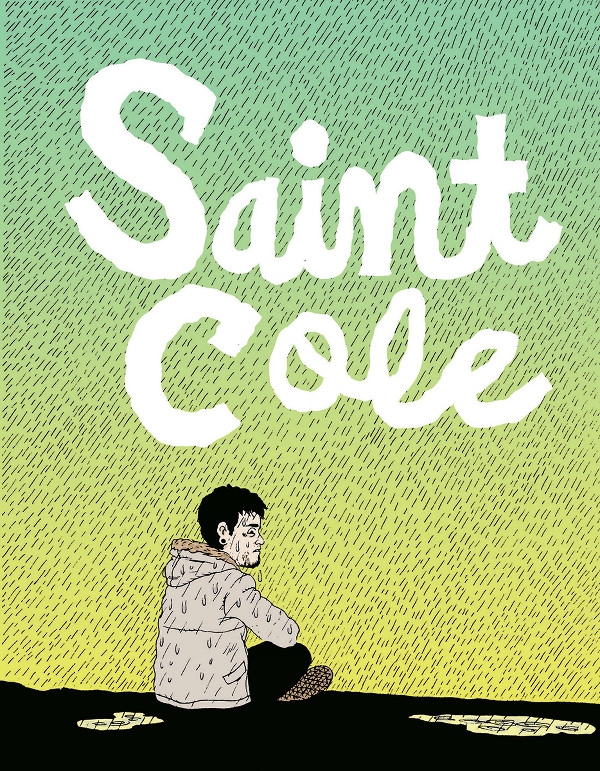
*****

Last week
Fantagraphics announced
Saint Cole as their second book with the cartoonist
Noah Van Sciver.
Saint Cole tells the story of four days in the life of a restaurant employee struggling to make ends meet while struggling to function through a cloud of alcohol, a terrifying level of responsibility, a certain amount of free-floating desire and severe money difficulties. The book is due in 2015. Van Sciver has plenty on his plate between now and then.
Youth Is Wasted, Van Sciver's first book with
AdHouse, collects several short stories from the cartoonist's self-published
Blammo! and various anthology contributions. Van Sciver is also a prolific maker of comics on-line, including intermittent diary comics and the serial
Fante Bukowski. A diary comic
is due from this summer from 2D Cloud and we may see
a collaboration between Van Sciver and Hic & Hoc this year or next.
The 29-year-old Van Sciver is among the cartoonists most respected by his same-age peers, and is sometimes portrayed as a man out of time for making comics that remind of those that were more common in the late '80s and early '90s -- something we get into below. I was happy Noah took the time during a busy
CAKE weekend to talk to me about his work: old, present and forthcoming. -- Tom Spurgeon
*****
TOM SPURGEON: I realized phoning you just now that this is the first time I've ever interviewed a cartoonist in my own time zone.
NOAH VAN SCIVER: [laughs] Oh, yeah?
SPURGEON: You're up in Denver. And although I bet you've talked about it in past interviews, I don't think I know how you ended up there so I assume that some folks reading this won't either. What is Denver to you, Noah? There aren't a lot of cartoonists in Denver, or in the entire mountain time zone.
VAN SCIVER: I wound up here... I was born in New Jersey, and lived there until I was like 10. My parents split and we moved to Arizona. From Arizona my Mom moved to Colorado and I came with her -- I was like 15 years old. So I've been up here since then. I started drawing comics up here. I didn't come here for any particular scene.
SPURGEON: You also probably get this question a lot: is
there a scene? Is it a different scene than when you first started doing comics?
VAN SCIVER: There's
Kilgore Books.
John [Porcellino] was up here for a while. They started the
Denver Comic Con a few years ago. There's a little scene happening.
It doesn't seem like the cartoonists up here are that ambitious.
Sam Spina was up here, but he moved. People don't seem to stick around up here for very long. [Spurgeon laughs] You know what I mean? A lot of cartoonists -- when I say ambitious, I mean just sending your comics out to blogs to have them reviewed, or going to conventions. A lot of people don't do that here.
There's a drawing group I go to every Tuesday night. There are cartoonists there. But they're just guys that have a webcomic or they bring their sketchbook or something.
SPURGEON: A lot of communities in the middle of the country feel a disconnect from the rest of what's going on, particularly on the coasts. Because of that, the local scene feels like the final destination, the last stopping point, as opposed to a stepping stone or one option among many. There was a time in the last 40 years where it seemed like cartoonists were everywhere, and now it seems like there are definitely a dozen to fifteen major communities. Do you get scene envy?
VAN SCIVER: Oh, yeah. [laughs] I do sometimes. I get scene envy for Seattle, really bad all the time. I think Seattle has the coolest thing going right now. The comics there are awesome right now. They have the whole
Intruder crew. There is a lot that's happening in Seattle. I think if I could thrive anywhere it would be Seattle, but I don't necessarily need to be around other cartoonists to thrive. I do better alone.
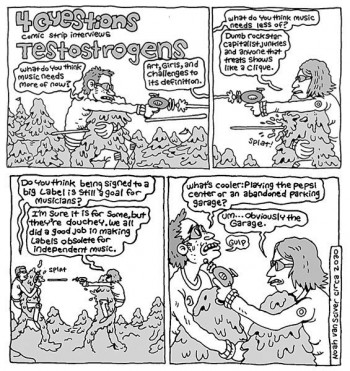 SPURGEON: That used to be considered an advantage. Is there a go-to aspect to that for you in Denver? I know you do some work for local publications. Is that because you stand out in a way you might not in a Seattle or a Portland?
SPURGEON: That used to be considered an advantage. Is there a go-to aspect to that for you in Denver? I know you do some work for local publications. Is that because you stand out in a way you might not in a Seattle or a Portland?
VAN SCIVER: Yeah, I think so. That's true. Definitely. Also, I'm way more aggressive about that kind of thing out here. If there's a publication, I want to be in it. I'm pretty active about contacting them and trying to get comics in there.
SPURGEON: You mean like alt-publications -- you just ask for some space to do something?
VAN SCIVER: Yeah. You know every city has the alternative weekly newspaper. In Denver it's called
Westword. They had a comic strip in it for a while but the guy quit. I kept submitting comics ideas and they wouldn't get back to me. They eventually gave the gig to somebody else. I kept at it. I kept e-mailing the editor and sending her stuff I was working on. When that cartoonist dropped out a year later I had another pitch for them. They were like, "Fine." They just kind of gave in.
Jules Feiffer was doing a reading in Denver one time. I went to see it. He said that the best advice he could give a cartoonist is to not say "No" for an answer. Keep bugging the editor. Eventually, they'll relent. It worked out for me. I took that to heart. Even with Fantagraphics I did that a lot. I kept bugging
Eric Reynolds until he said, "Yes." For
Mome. That's kind of my technique.
SPURGEON: Has it ever backfired?
VAN SCIVER: Ummm...
SPURGEON: Has it ever backfired with someone other than me?
VAN SCIVER: [laughs] I don't think so. If it has I just moved on, didn't think about it.
SPURGEON: You mentioned John Porcellino. He just had his 25th anniversary with King-Cat
. I remember I went looking for covers, and you're actually featured on one of the covers.
VAN SCIVER: Oh, right. Yeah.
SPURGEON: You've already talked about not being in a place where you're seeing a wide array of professional role-models. I wonder if John was that for you. What was it like to be a fellow cartoonist working near him? He is such an admirable figure, but at the time he's also a really honest one in terms of the realities and shortcoming of a life making art. There's almost no bluster there.
VAN SCIVER: It was exactly what I needed. Yeah, he's really realistic about what you can do with comics as far as a career goes. I feel like that's something a lot of people don't understand. A lot of young cartoonists think they're going to do comics and that's going to be their living. They'll be like
Frank King sitting in an office, wearing a tie, and doing comics. John put it into my head that that doesn't exist anymore. It's not about making a living at comics anymore as much as it is about this being your art. If you're going to do it, you're going to do it. It doesn't matter about making money.
That was big for me. I didn't know that. I thought if you put out a graphic novel or something, you had it made. You could live off of that and do comics for a living and be fine. Just knowing him woke me up to the fact that comics are something you do because that's who you are. It's not something you can make money from.
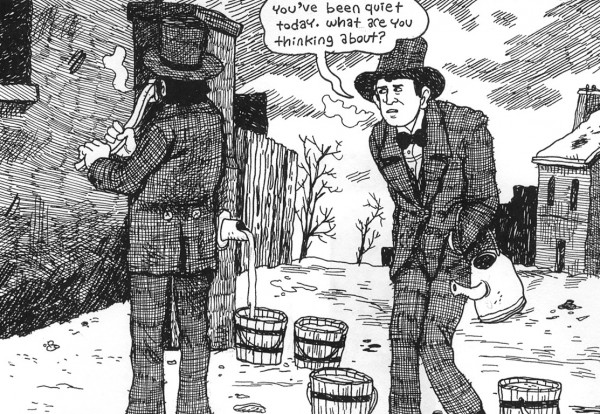 SPURGEON: You did the Lincoln book,
SPURGEON: You did the Lincoln book, The Hypo
. Did your experience with John color your perception of the experience of doing that book? Because you did get positive word-of-mouth on that one, just the kind of thing that might make you think there was something grand about to happen. Were you inured to that, having worked with John?
VAN SCIVER: I didn't go into it thinking I was going to make a lot of money. I did it because it was something I was interested in. It was something I wanted to learn about. I don't know. It was a book I wanted to exist. I didn't think it was going to make my career or anything.
SPURGEON: Were you able to enjoy the attention it received?
VAN SCIVER: Oh, yeah.
SPURGEON: I talked to one person yesterday that thinks of you as just having done that one work. Was it interesting to be exposed to a new audience?
VAN SCIVER: Yeah, I enjoyed that. It seems like as soon as Fantagraphics even announced that book, I was getting more respect than I had for just doing [his comic book series]
Blammo!. You know? I enjoyed that, because I want that. I was brought up to a different level. I think that respectability is very good.
SPURGEON: Was The Hypo
also a departure for you in terms of work habits in addition to the kind of material you were doing? You mentioned it was a book you wanted to exist, but it seems like an anomaly in your career in terms of the research involved and the kind of psychological portrait you achieve. Is that a mode of working to which you'd like to return?
VAN SCIVER: Yeah, I plan to do another book similar to that one on Joseph Smith. It just takes so much time. I enjoy doing that, because I enjoy learning about history. It's more of a passion project than anything else. I'll get to it whenever I get to it.
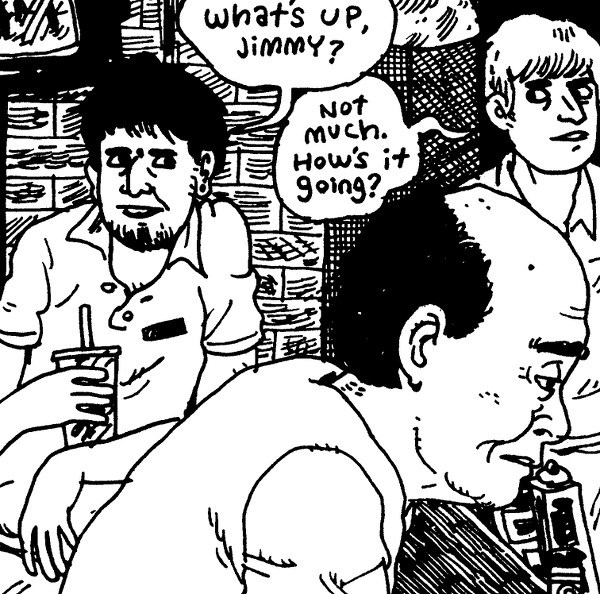 SPURGEON: You and I are talking today because Fantagraphics announced
SPURGEON: You and I are talking today because Fantagraphics announced Saint Cole
for next year, and you'll be appearing at CAKE in Chicago to sign your previous work and, one would assume to talk to anyone that brings up the announcement. Hearing you were doing this one with Fantagraphics made me go track down what I could find of it on-line. That's an interesting book.
There's a recurring theme in your career of dealing with this kind of protagonist in this kind of situation. You have four or five stories that feature a barely-coping, marginally functional working class guy saddled with sudden responsibility for which he may not be suited. There's Anthony in "Abby's Road" and Kramer in "Expectations" and the guy in 1999
-- who was "Mark," maybe?
VAN SCIVER: Mark, yeah.
SPURGEON: This is obviously a milieu or set of circumstances that interests you. Is it fair to connect these works that way?
VAN SCIVER: I think so. Up here in Denver at least, that's the average guy, the average twenty-something person. That's who I can write because I'm around those kinds of people. Maybe I have pieces of those people in me. I don't know, I guess that's just who I'm interested in right now. The loser character, you know? Maybe I'll get out of it eventually.
SPURGEON: So you don't feel like you're returning to a specific story, and retelling that story. This is just the character type in which you're interested, and these are the stories that present themselves to you for those characters.
VAN SCIVER: Yeah. Exactly.
SPURGEON: What specifically
interests you? Is there something that interests you more than other things? I know from your diary comics and from talking to you that you have shared in these kinds of jobs. According to what your brother wrote in the new AdHouse collection, it sounds like you were in that kind of setting as a kid. Or at least that's what's hinted. Do you have interest in the social setting aspects? The class aspects?
VAN SCIVER: Yeah, I think so. It's just a guy that has to work a shitty job to survive in this country. You just have to bust your ass and then you barely scrape by. It's something that I do, and it's something that I'll probably always have to do. So maybe in a certain way I'm expressing whatever agony I have in me. [laughs] Like a regular loser guy.
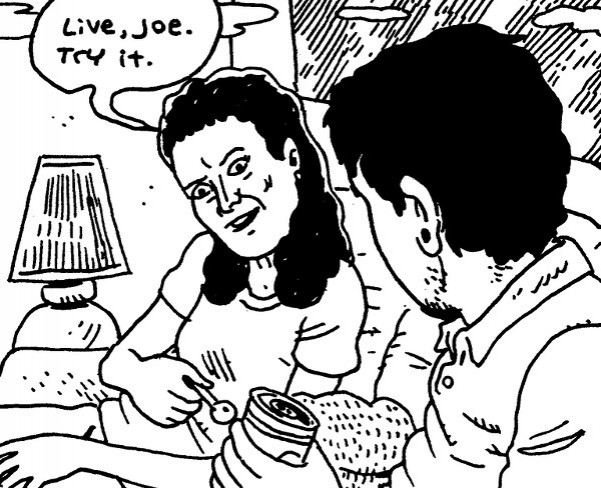 SPURGEON: There's also drug use or chemical use with a lot of these characters, and the portrayal is critical. It's not a rebellious act, or a release, it's almost always something that complicates someone's life. Is that just true to what you're observing?
SPURGEON: There's also drug use or chemical use with a lot of these characters, and the portrayal is critical. It's not a rebellious act, or a release, it's almost always something that complicates someone's life. Is that just true to what you're observing?
VAN SCIVER: You're talking drugs and alcohol?
SPURGEON: Yeah. If you go back into comics history, the underground comix influence makes this a kind of rare criticism within a narrative. Twenty-five years ago, Terry LaBan was doing his run of alternative comics in Unsupervised Existence and a few related titles, and it was seen as quite striking and odd that he was very critical of drug use.
VAN SCIVER: It's just showing the escapism aspect of it, but it's not a
good kind of escapism.
SPURGEON: So is that observed? Based on your own experiences?
VAN SCIVER: I've never done any of that stuff. I've never smoked meth. [laughter] I live in Denver, where everyone smokes weed. Drinking... everyone drinks, too. I'm not against it. It's just the reality of what people are doing now.
I wasn't trying to portray it as good or bad. It's just that character's escape. Cole is smoking meth to escape all of this responsibility. He just wants to get away. He was just dating this girl who got knocked up; now he feels like he has to stay with her. Then her mom moves in. All of this stuff is piling up on him, and he's looking for any way out of it. It's just an escape.
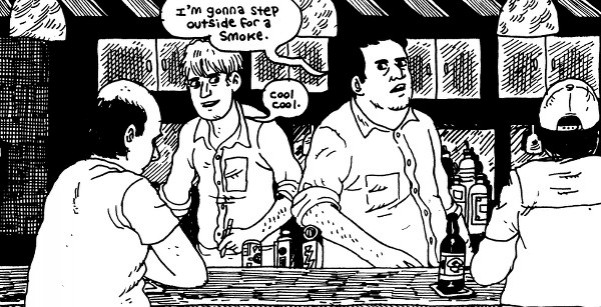 SPURGEON: One thing I liked about
SPURGEON: One thing I liked about Saint Cole
as compared to some of your sketchbook comics, say, is that there's a real grounded, studied approach to the figure drawing. There are a variety of looks; it seems very observed. Even throwaway characters seem to have a specific reality to them. Do you draw on sketchbook drawings or people you know when putting together a story like this one?
VAN SCIVER: It's just the kind of people that are in the background, people that are hanging out. Sometimes I'll put in somebody that I know. I'll have them in the background. These are the people that inhabit that world. Middle America. The regular types.
SPURGEON: When I've talked about your figure drawing with some of my friends, something that comes up is that your figures are kind of anti-heroic in terms of how they stand; they're almost comedically wobbly in a lot of ways, in a way that carries over to the dramatic material. You seem to get some mileage out of making the characters physically act, portraying their certainty or confidence in this very physical, forward way.
VAN SCIVER: It sounds like I should get some more anatomy books. [laughter]
SPURGEON: Do you work quickly, instinctively, on the page? How studied is a page, do you go back and work things over?
VAN SCIVER: I draw really fast. I'm drawing all the time. As we're talking, I'm drawing. And I don't stress out over pages at all. I think, "That's great. That's good. That works for what I want to do."
SPURGEON: Was it always that easy? Were you always able to make such strong decisions?
VAN SCIVER: It depends. I'm getting ready to go to CAKE today, where I'll be around a lot of great artists. When I come back, I'll probably have some trouble drawing because I'll be intimidated. I'll get over it in a day and get back to drawing really quick.
SPURGEON: When I've read some of the answers you've provided questions via tumblr, one that comes up is a time where you fairly gave up on the careerist aspects of doing comics -- something we discussed a bit earlier in this talk. Did that have an effect on your art? Did making comics pages become easier for you once you made that realization?
VAN SCIVER: Yes. There was a moment. It must have been... I remember talking to John P. about this. Whenever you see an older cartoonist still trying to make it as a cartoonist, and you see how miserable they are, you think you don't ever want to live like that. I don't remember when it happened, but I made the decision that while I love comics, and it's something I always want to do, I don't want to be one of those older guys. Struggling all the time. Having a wife that's just pissed off at them because they're not bringing home the bacon or whatever.
SPURGEON: You can name names.
VAN SCIVER: [laughs] Not while you're recording. Maybe at
SPX, after a beer.
SPURGEON: Another sense I get from reading you in other interviews and in similar settings is how keenly aware you are of the pleasure of making comics. You not only enjoy them generally, and do them a lot, but there are moments when it is extra-pleasurable.
VAN SCIVER: Oh, yeah.
SPURGEON: Is it important to you that it stay pleasurable, given your orientation to it?
VAN SCIVER: Yes! People will e-mail me and try to get me to draw their comics for them, and I can't think of anything I would like to do less: work with somebody else. I like doing my own comics and telling my own stories. If this isn't my job, why should I ever want to stress out about it?
SPURGEON: Are your comics pleasurable to you after the fact? Do you revisit them?
VAN SCIVER: Not that often. When I put together the AdHouse book [
Youth Is Wasted], that was a weird thing going through all those comics. I had an idea of what I wanted to be in the book. Going through the old issues of
Blammo! to see if I was missing anything, that was pretty brutal.
Robyn Chapman -- do you know that cartoonist?
SPURGEON: Sure.
VAN SCIVER: She posted a picture on Facebook of the first two issues of
Blammo! she picked up at a yard sale a couple of days ago. It was so embarrassing! I'm like, "Please don't read those." It's hard to think about those things as existing and out there in the world.
SPURGEON: Most of the material in the AdHouse book is later material. [Van Sciver laughs] There were not a lot of comics from the early issues.
VAN SCIVER: Oh, man. There's just nothing there.
SPURGEON: How do you think you're a different cartoonist now? How do you see it?
VAN SCIVER: I have a better grasp on the kinds of stories I want to tell. Currently, it's that 20-something loser character. I have a lot to say with that character. [laughs] I want to write those stories, or more history, and it's all about communicating actual feelings instead of trying to tell a dumb joke or be self-deprecating like every cartoonist is at the beginning.
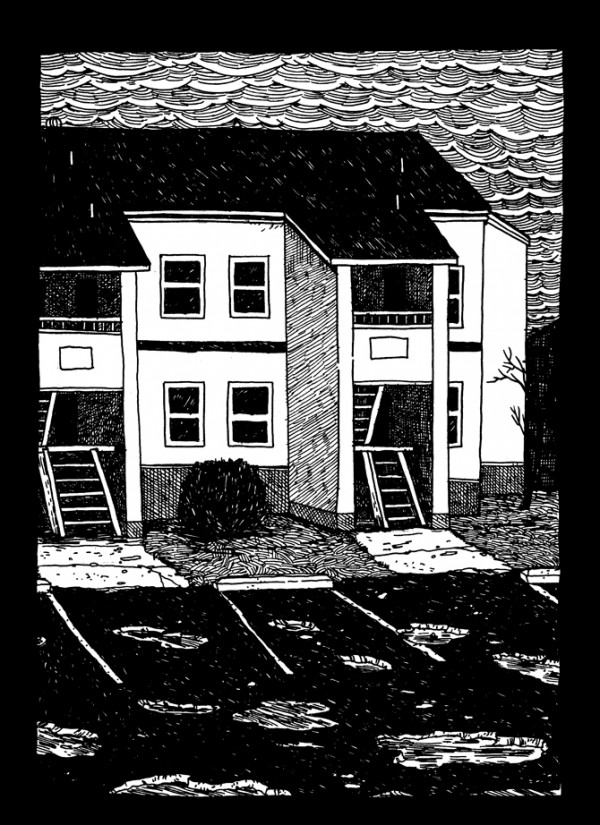 SPURGEON:
SPURGEON: Saint Cole
, will this be your first work to start out primarily on-line, without the thought of Blammo!
or a print comic as an intermediate step? The first one without a print destination in mind
?
VAN SCIVER: Yeah, it was.
SPURGEON: Does that change how you approach a work structurally?
VAN SCIVER: Yeah, it does.
SPURGEON: Because Saint Cole
is ambitious in terms of its structure page to page. You open some pages to single-illustrations, there are some that have a more baroque design -- you play with how the eye is moved around. How does working on-line change that? Is it harder to do that kind of thing there? Easier?
VAN SCIVER: It gave me more freedom to do whatever I wanted. I never thought about how it would look on the printed page. When you're doing a comic for print, you also have to be really conscious of page count. That's another thing. I didn't worry. I didn't have to think about it being 24 pages or 36 pages; I was just drawing. When that chapter was done it was done. So in general, there's more freedom.
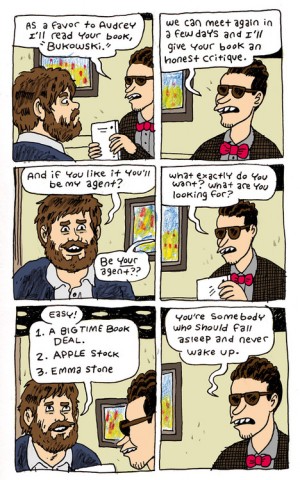 SPURGEON: What about the feedback loop that's available to posting your work in that way? Does that have any effect on you?
SPURGEON: What about the feedback loop that's available to posting your work in that way? Does that have any effect on you?
VAN SCIVER: Yeah. And I actually really like that a lot. For
The Hypo there was some press and stuff, but I didn't get a lot of feedback from people. I wasn't getting a lot of e-mails back from people saying, "I really love this book." If I had posted it on-line, I probably would have gotten a lot more. I've been doing
Fante Bukowski on my tumblr page, and a lot of the fun is seeing what people think about it, the responses I get.
SPURGEON: Now that you mention it, people seem to react to that character pretty strongly... why do you think that is?
VAN SCIVER: I think it has to do with that everybody knows some douchebag writer like that: someone who romanticizes the struggling writer, the struggling artist role. They don't care about doing what it takes to actually become a great writer, they just like living that struggling-writer role. They like having that title. I think people find that funny.
SPURGEON: Is that someone specific to you?
VAN SCIVER: It's a few people I know. [laughs]
SPURGEON: SPX?
VAN SCIVER: [laughs] Okay.
SPURGEON: Seth's very generous, very nice quote on the back of the AdHouse book paints you as a cartoonist perhaps more suited to the comics world of a generation ago as opposed to now. It's a sentiment I've heard about you in a few other places. How do you
feel about that idea? Do you feel like a cartoonist out of time? Do you think your work would be seen differently had it come out in the late '80s and early '90s.
VAN SCIVER: Yes. I definitely think that. I feel a stronger kinship to those comics than to the comics coming out now. The focus seems to be... the focus largely seems to have been taken away from telling stories and it's been put more on the art and how artsy you can get. Page layouts aren't about visually storytelling anymore, they're about making a large drawing that hopefully you can read. I don't have anything to do with that stuff.
SPURGEON: I would have thought the break for you was sensibility/subject matter. But you went formal approach. Maybe you feel less alone there. Are there cartoonists near your age you feel are more direct peers? Is there anyone near your age that does work of a similar kind?
VAN SCIVER: Yeah, sure.
Joseph Remnant. That's the obvious one. Let's see.
Chuck Forsman.
Julia Gfrörer. There's a lot of them --
Sean Ford, I really like his work.
SPURGEON: You feel like they have a significant interest in narrative, in story.
VAN SCIVER: Yeah. I'm not into stuff that looks too stylish. I could never get into -- and I know this is blasphemy -- but I could never get into
Paper Rad. It just seemed like it would be dated soon. It was all about the surface. It doesn't do anything for me.
SPURGEON: You don't have anything about applying moment of visual significance within a story, though. There are moments in Saint Cole that are sustained because of how well you've drawn them, it's not all symbols and suggestions.
VAN SCIVER: But it's all helping the story. It's serving that purpose. It's never "check out this drawing."
SPURGEON: Another distinguishing element to your career so far is the range of publishers with whom you've worked. You've done one book with Fantagraphics and just announced another. You have a book with AdHouse that is out now, and will formally debut at Heroes Con in a couple of weeks. A quick peak on-line suggests you may have books soon -- or a little later -- with Hic & Hoc and with 2D Cloud.
VAN SCIVER: The Hic & Hoc eventually. [laughs]
SPURGEON: Why this sprawl of publishers? The cartoonists you admire most, they all seem pretty locked into specific partnerships, whereas you don't.
VAN SCIVER: When I'm working on a project, I'm always thinking about who the best person would be to publish it. I think if it's more weird, I'll probably want to work with 2D Cloud. Those guys are really great -- and really weird. Hic & Hoc came about just because I like Matt. I think he's a cool guy and I wanted to work with him on something. Yeah, I'm still working on that. With books, there's Fanta, and with AdHouse I just like Chris Pitzer a lot. [laughs] I don't know.
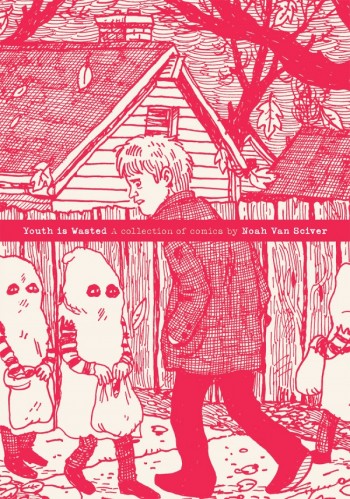 SPURGEON: What is it about Chris Pitzer that you thought that book was suited to him? He's doing a lot of younger cartoonists this year.
SPURGEON: What is it about Chris Pitzer that you thought that book was suited to him? He's doing a lot of younger cartoonists this year.
VAN SCIVER: I really like everything he does. I think AdHouse is an amazing publisher. I remember that Paul Hornschemeier book he did, where it was a collection of his short stories. I like Paul Hornschemeier, too, so I thought working with Chris would be a good fit. So I pitched it to him, too.
SPURGEON: He has a very specific design sensibility.
VAN SCIVER: That, too.
SPURGEON: I'm surprised by how often the design opportunities thing comes up when I talk to younger cartoonists, this chance to work with someone to get at a specific look. I don't know who you worked with at Fantagraphics.
VAN SCIVER: That's a good point. I really like that and I benefit from that because I'm not a good designer. So like with Fanta, it was Jacob Covey on
The Hypo. Chris Pitzer. The 2D Cloud guys, they can pull off stuff I cannot do. They all can. With
The Hypo I took all the pages when I was finished and mailed them to Fantagraphics and had them scan them in and everything. [laughter] It was the total '90s cartoonist move.
SPURGEON: What a pain in the ass you are. [Van Sciver laughs] Your next diary comic is with 2D Cloud. That's not exactly experimental.
VAN SCIVER: It seems experimental to me! I don't know. [laughs]
SPURGEON: You've been very adamant about only doing diary comics is 30 day bursts. Where does that act of creation fit into the other comics that you do? Does it feel different to have one of those going on than one of your other projects? What is an experience you have doing one of those that is different than working on a Fante Bukowski
?
VAN SCIVER: It's the same! It's a challenge. With the diary comics it's like, "Let's see if I can do 30 of these." It's a project for fun. With
Fante Bukowski I have a sketchbook that's 52 pages long, let's see if I can make a graphic novel in this sketchbook and post a page a day. If I can post a page a day of this comic, then I'll have a graphic novel in two months?
SPURGEON: I don't think of formal constraint as something you do, but I guess it is -- what you're doing is like a playwright restricting themselves to a specific space or a certain number of characters. Is this kind of overt decision about a project new for you?
VAN SCIVER: It is new. The first time I did that was last Fall when I did the first batch of 30-day diary comics. It's a new challenge. In a way,
Saint Cole was the same because Joseph and I put up a web site and then we were like, "let's see if we can put up a chapter." We totally failed at our goals. We were supposed to have that web site for only a year, and have a graphic novel each in a year. I just finished mine, and I don't think Joseph's anywhere near to finishing his.
SPURGEON: Considering you've had some success and some failures there, do you feel more confident in how the on-line component of your career works within the overall fabric of your wanting to make art?
VAN SCIVER: Sure. It's helping me build an audience.
SPURGEON: What's your audience like? Do you have a sense of them?
VAN SCIVER: Kind of ugly. Kind of mean. [Spurgeon laughs]
SPURGEON: You mentioned your affinity for cartoonists that emerged in the '80s and early '90s, do you share a fan base with them?
VAN SCIVER: I think in a large way, yes. I remember being at an SPX and signing
The Hypo. I was with Lilli Carré, who was signing
Heads Or Tails. All of her fans were these really beautiful people. Everyone that came to buy my book was an old guy you wouldn't sit next to on the buss. A guy with a limp. An eyepatch. A hook. Just pirates, basically.
SPURGEON: I don't remember a lot of eyepatches at that show, Noah.
VAN SCIVER: That's because you don't even see them. They're in the background, and you ignore them.
SPURGEON: This will run while you're at CAKE, in Chicago. Do you like the shows, Noah? They're a huge part of comics.
VAN SCIVER: I like the stuff after the show. The show itself can be kind of tiresome.
SPURGEON: That's good, that's exactly the message you should be putting out there. [Van Sciver laughs] You find the interaction with people buying your work tiresome.
VAN SCIVER: It's not like that!
SPURGEON: It's worth suffering through these people to get to the good stuff. [laughter]
VAN SCIVER: You know what I'm talking about. You're in this room for so long... you feel disconnected by the time you get out of there.
SPURGEON: Did you ever kill it at a show?
VAN SCIVER: Mm... nah.
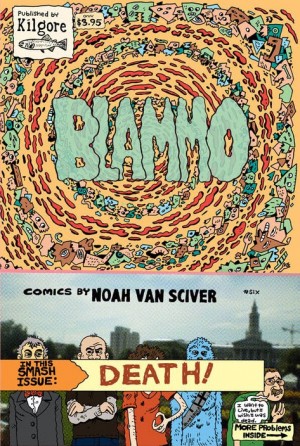 SPURGEON: You've never had that show where you thought everyone was talking about you, that a specific work had touched a nerve with readers or your fellow cartoonists?
SPURGEON: You've never had that show where you thought everyone was talking about you, that a specific work had touched a nerve with readers or your fellow cartoonists?
VAN SCIVER: It seemed like... when I did
Blammo #6 it seemed like that was a big turning point for me. It seemed like all of the sudden whenever I'd go to the show I'd get a lot more attention. People were like, "Oh yeah, this is..." That was the year I was nominated for an
Ignatz Award and all of this stuff. I was like, "Oh, this is so exciting. This is great." Matt Madden e-mailed me.
I still remember when with
Kate Beaton,
Hark! A Vagrant came out and it was like the biggest thing ever. I still want an experience like that. Or
Ed Piskor with
Hip Hop Family Tree, where it's already in its third printing. Jesus Christ, I can't even imagine that. I want that experience. That would be really fun. I want to be able to post a picture of the
New York Times bestseller list with my book circled. "Check it out, motherfuckers!"
SPURGEON: Do you think you have work in you, work that will connect to people in that way?
VAN SCIVER: Yes.
Fante Bukowski. That's going to be my bread and butter. [long pause] [laughs] I honestly don't know. [laughter] I mean, who can tell? I don't think about it. I'm not searching for ideas that could be the next
Hip Hop Family Tree or
Hark! A Vagrant. I can only do what I'm interested in.
SPURGEON: You do enough stuff, though, Noah, that I wondered if there wasn't one that you privileged in that way, that you thought would be the one that might connect with people in a way different than your other projects.
VAN SCIVER: Oh, no. I don't know. I guess we'll have to wait and see. If you have any thoughts on the matter, I'm open to them.
SPURGEON: Wait, have you won any awards? You won one of the Ignatzes, right?
VAN SCIVER: No. I've been nominated but I always lose. And I can't even complain because the people that beat me are always talented. The first time was
Lisa Hanawalt. The second time everyone told me I was going to win. "This is it. People like you more than all these other people. You got it." And I was like, "Oh, really? Maybe I will." [Spurgeon laughs] And then
Corinne Mucha won. [laughter]
I try not to get bummed about it now.
Gary Groth told me last year after the Ignatzes last year, "What do you care? Do you do comics hoping for a carrot?" [laughter] I always think about that now. Who gives a shit? Gary sure is good at crushing whatever happiness you have.
SPURGEON: He comes to Denver to teach, right?
VAN SCIVER: He does! Every summer. We hang out. He's great, man. I love Gary Groth.
SPURGEON: You turn 30 this year, don't you? Is that weird?
VAN SCIVER: It's really weird.
SPURGEON: What's weird about it?
VAN SCIVER: Feeling like I'm not ahead in life, feeling like I'm not where I wanted to be. I'm still financially insecure. [laughs] I feel like I'm still not a grown-up, and I wanted to be by the time I was 30. I didn't focus on that.
SPURGEON: I remember 29 being hard in terms of those issues, but actually turning 30 wasn't so bad. Twenty-nine, though, that was a year full of dismay and regret.
VAN SCIVER: Yes. Yes, that's how my year has been.
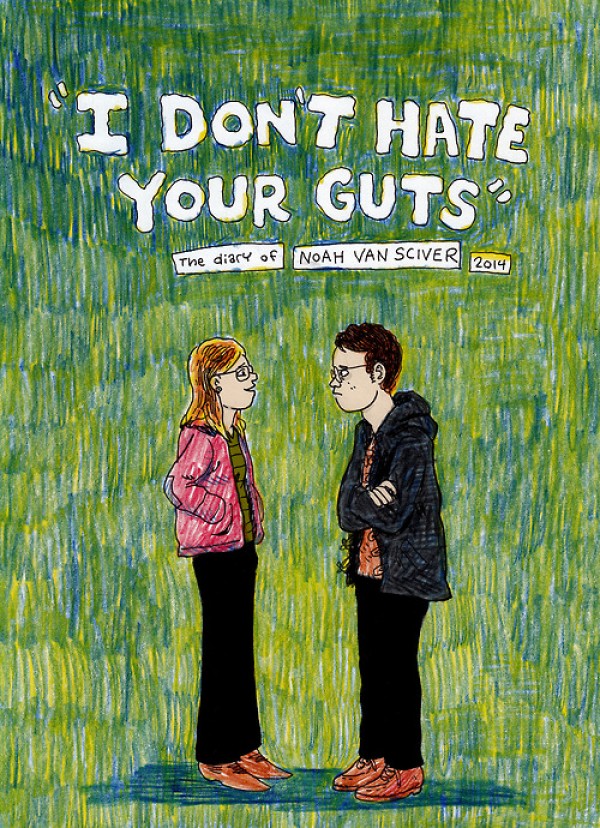 SPURGEON: It can't be the whole year that's been bad, because the diary comics suggest at least an upturn in your personal life. Was that weird to have a relationship bloom in the middle of doing a diary comic?
SPURGEON: It can't be the whole year that's been bad, because the diary comics suggest at least an upturn in your personal life. Was that weird to have a relationship bloom in the middle of doing a diary comic?
VAN SCIVER: Yes! [laughs]
SPURGEON: How did you handle that, were you worried about how that would come across while that was happening?
VAN SCIVER: A little bit. I didn't want to cross any boundaries with her. She didn't know about it. I was doing these comics. I would draw a date because that's what I was doing, and then it started to work out. And I thought, "God, what if she sees these diary comics and gets upset that I was drawing all of this stuff?"
SPURGEON: I assume she's seen them by now?
VAN SCIVER: I didn't know this, but she had googled me and she saw them. Luckily, she had no problem with them. And she likes them now. 2D Cloud is supposed to put out that mini-comic on my birthday. It's dedicated to her. We live together now. It's all happened really fast.
SPURGEON: What do you do now? Do you continue doing what you're doing and just hope things work out? When we talked earlier about your not having any lofty expectations for your comics-making, I have to admit, it doesn't seem like your strategy is all that different from someone that does. [laughter]
VAN SCIVER: I just don't get my hopes up.
SPURGEON: You're like everyone else, just less hopeful. [laughter]
VAN SCIVER: I guess so. I assume I'll always have to work, like at a deli or a bakery or something. I'll just do comics at night.
*****
*
Noah Van Sciver on Tumblr
*
Noah Van Sciver on Twitter
*
Noah Van Sciver's Site With Joseph Remnant
*
Saint Cole, Noah Van Sciver, Fantagraphics, softcover, 112 pages, 9781606998175, March 2015, $19.99.
*
Youth Is Wasted, Noah Van Sciver, AdHouse, softcover, 112 pages, 9781935233275, August 2014, $14.95.
*
Noah Van Sciver and Tom Spurgeon, Friends Forever
*****
* the cover image released for
Saint Cole; who knows if it stays the same
* self-portrait swiped from Brian Heater's interview; for some reason I've never taken a photo of Noah
* a
Westward comic
* from
The Hypo
* four from
Saint Cole, hopefully understandable in context each time out
* a
Fante Bukowski installment
* the new book from AdHouse, collecting earlier material and short stories
*
Blammo! #6
* cover to this year's 2D Cloud mini
* pouring a drink in
Saint Cole [below]
*****
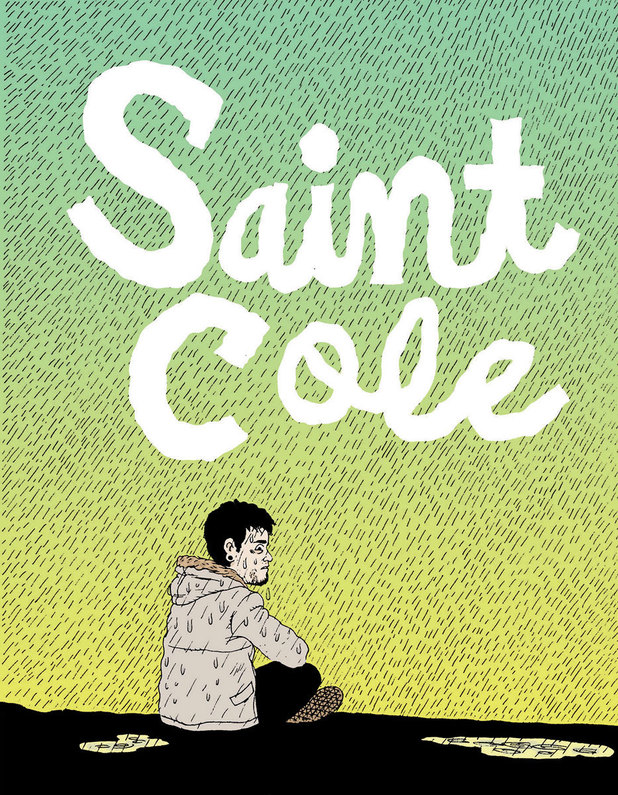
*****
*****
posted 8:00 pm PST |
Permalink
Daily Blog Archives
November 2019
October 2019
September 2019
August 2019
July 2019
Full Archives


